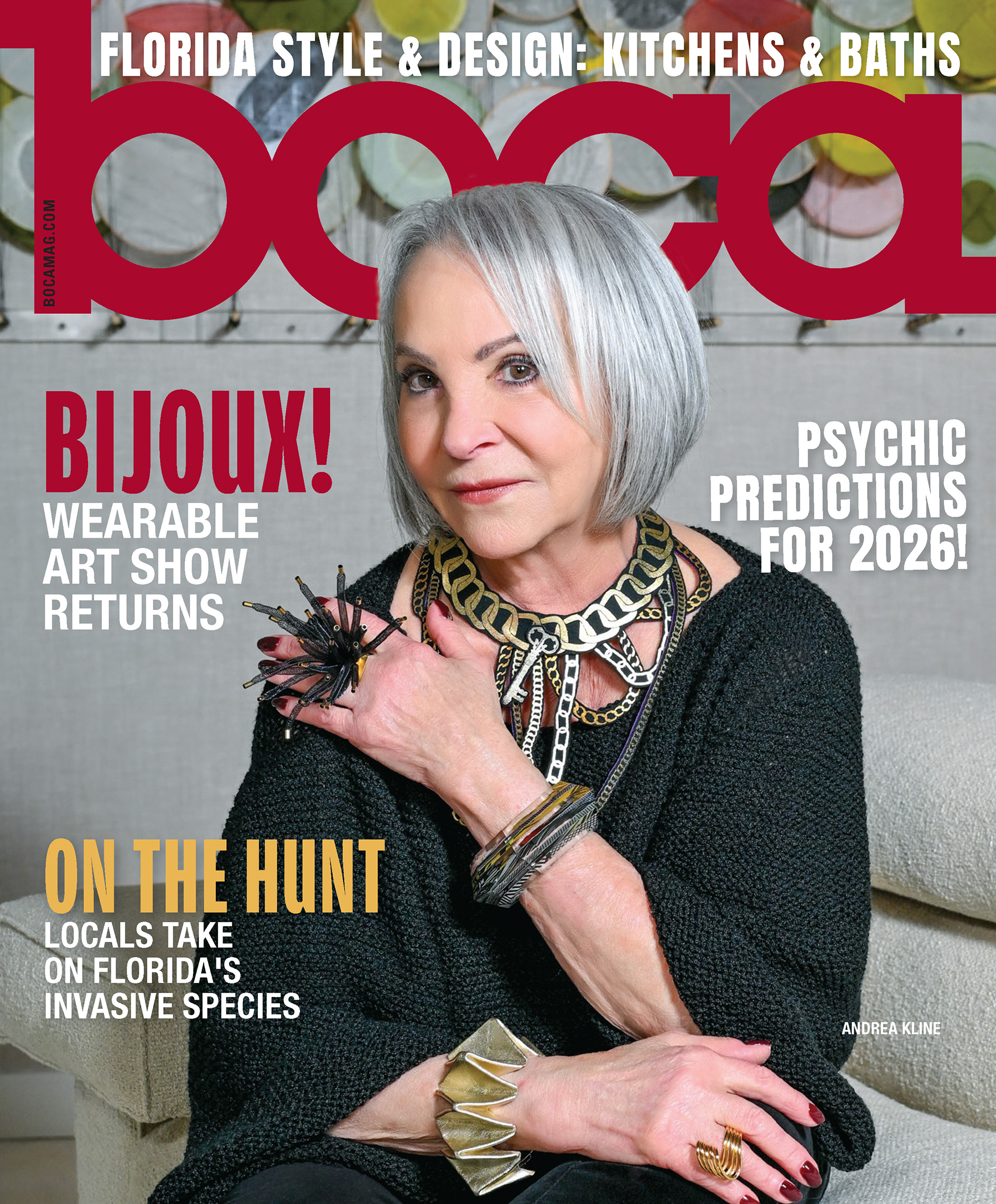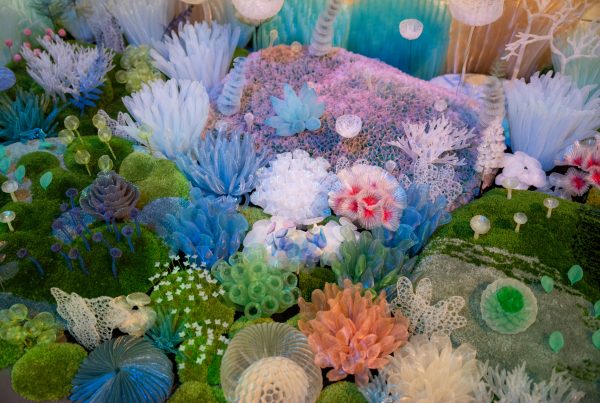Comedian Dana Eagle has spent much of her career turning lemons into funny lemonade. A cancer survivor who has been diagnosed with bipolar disorder and depression, Eagle has followed in the footsteps of confessional comics Maria Bamford and Tig Notaro, discussing her ailments in her standup act, in which she also offers cutting, candid insights into topics like religion and life as a gay woman.
Eagle’s inspired and expertly material has led to appearances on HBO and TBS, “The Tonight Show” and “Last Comic Standing,” USO Tours overseas and opening gigs for Bamford and Bill Maher, among many others. This Saturday, she’s visiting Boca for a one-night-only gig at Mizner Park Comedy Club.
How did you break into comedy?
I had a big interest in theatre, and I like to say I was in musical theatre and was asked to leave, which is a little true. I was in a tour of “The Wizard of Oz,” after college, but in the only non-singing role. I kept trying to convince the cast that even though I don’t have a singing role here, I actually can sing—I’m a gifted singer. After three months, they were like, “no, you’re a terrible singer. And you’re awful to be a bus with: You’re obnoxious.” So they said, “You should actually try standup comedy.”
I took a weekend workshop, and I was like “yes, this is for me.” It’s more about being who you are. … It was exactly where I belonged.
Did you find it easier to memorize your own words than somebody else’s?
Yes, it was easier also to make them fit. And if they’re not perfect, you keep adapting them to you. The weird thing with standup is that it actually gets harder as you go, because as you become absorbed in the art form, your standards become higher. You have a sense already of, yeah, OK, I know this kind of line makes people laugh, but that’s an easy laugh. It’s like the difference between the Ice Capades and the Olympics. There are certain moves that we know are flashy and easy to do, but you want to become more original, especially because there’s so much stuff out there. [Then again], sometimes you go to a show and your job is just live, and don’t fall apart. Different venues have different demands.
It’s interesting how when you start, you just have all of this confidence, because you can’t believe you make people laugh. It feels like a superpower, and you start to take it for granted as you go along.
Your cancer battle and bipolar diagnosis and depression have inspired some great material. Did it come naturally to you to bring these darker aspects of your life into your act?
I guess the bipolar was the first one. So no, but luckily my friends were all comedians. As I would say things offstage, they would say, “why aren’t you doing that onstage?” With each area, as I was doing it, I could feel my face turning red at the same time. I know we’re in an oversharing society now, but that was never what I set out to do. Luckily, I just wanted this thing so badly that I was like, “OK, if this is what it takes!”
I would get nervous when audience members wanted to talk to me about it afterwards, because I felt very protective over things that were deeply personal. I’m still not as personal as a lot of comedians out there. Maria Bamford exposes herself much more about her battles with mental health. I still keep a lot private. But I noticed when people came up to talk to me, they mostly wanted—and I don’t mean this in a negative way—to share about themselves. They just wanted somebody to relate to.
The key to the cancer material was that they had to know at the beginning that I’m OK. Also there’s a part of it where it has to be relatable. One thing I’m struggling with now is making sure I find a reason in the moment to talk about myself. Everybody’s got their own stuff going on, and they’re such unique experiences. There is something to be said for the fact that people want to hear about marriage, and men versus women. I have to challenge myself to find my way into those regular topics that are more of a cross-section of America.
Will there come a point—and maybe it’s already come—when you don’t want to be thought of as the bipolar comic, or the comedian who talks about her health issues? Are you branching beyond those topics?
I hope so. I don’t know how much control I have over it. This year has been much more about assigning myself the task of saying something about everything: Try to turn on that inner voice throughout the day so that what I see is what other people are seeing too—so I’m not locked in my own thing. I think also, I have had this very odd career in the sense that I’m gay, and I have these labels, but I’ve never gone after one or the other of them. It was always what unfolded, and by the time I was out, I was already at all the mainstream clubs. And then finding my footing into a gay audience has actually been harder for me.

If you perform in very conservative states like Alabama, do you adjust your material accordingly—and not do any gay material, for instance?
Oddly, gay has become fine. I think everybody has gotten on board with gay, because everybody knows someone who’s gay. But I have a lot of religion jokes, and those actually are the harder ones. Those I can’t do. But what’s funny is I have religion jokes for each side. With Christians, I can make a few Jewish jokes, and Jews generally laugh at Jew jokes, but there’s still things I can’t do with Jewish people.
I’m meeting with a friend today for a show, because Saturday will be a pretty big cross-section of people. In L.A. and New York, they appreciate you pushing the envelope. They appreciate you taking the chance. Other places, there are certain words that set people off. Sometimes you don’t feel it until you’re there. When I first started, I thought I knew which jokes I could do just by looking at the set list and crossing out things. Then I’d be onstage doing a joke, and all of a sudden I would get to this certain phrasing, and I’d be like, I can’t finish this joke! I’ve said this onstage: “If you want to know the end of it, come see me afterwards!”
There’s something to be said for just not caring, but then you might not asked back.
You hit on exactly what I’m going through now. I was never a marketer. That was never my thing. I just went where the work took me. I never targeted a specific group, and I think there’s a little bit now of, “should I have just gone after my people, more of the gay, liberal, alternative audience? How far will I go playing to mainstream audiences all the time?” Because it’s always going to set up a certain limitation for me. I have a friend who does mostly gay audiences, and she says the goal is to be able to play to every audience. So we all find a certain way to torture ourselves.
You’ve opened for Bill Maher, and you could probably say anything you want in that case.
Yes, they love it, and that’s probably more the ideal in comedy. But you have to cultivate that crowd over the years. I think what Seinfeld said is true: Great audiences help you write more, and tough audiences help you edit more.
What’s your take on the Boca audience?
Horribly scary. I’m deeply frightened. I’ve always had a policy of not performing for people I know. My mom comes to my shows. (Full disclosure: Eagle’s mother, Gail, works in sales at Boca magazine.—Ed.) If people that I know come, I always say, please sneak in the back, I don’t want to know that you’re there. Because you’re creating a group experience. We’re all going through this together. So your mind, and everything, has to be in the moment. When you look out and see somebody that you know, and then that person relates to all these other things in your past, it can challenge your concentration.
I think there’s going to be a cross-section of relatives, mom’s tennis team and a group of LGBT to balance it out. I’m a little concerned that I’ll have a few different audiences that want several different things. Freaking out is generally the best thing, because at least you prepare. I don’t know if it ever gets easier.
Lastly, you met Roseanne when you performed on “Last Comic Standing.” I’m curious if you have a different take than the mainstream consensus about her racist tweet. As someone who has been diagnosed with a mental illness, do you have more sympathy for someone who also purportedly suffers from mental health issues?
I definitely do. I can’t sit here and say I’m being objective and unbiased, because I’m not. I also think there’s something to be said for how women in comedy, or at any level, have to pay for their missteps versus how men do. But let me be very clear: I was horrified by the comment. Even for myself, I wouldn’t allow these excuses for anyone else, but I can personally say, that’s not who she is. She’s not like that. At the same time, if I heard someone else saying that, I’d say that obviously is who they are. You can’t distance yourself from your words.
I do feel like it’s more indicative of a mental health issue than a racism issue. It’s just heartbreaking all around, to watch somebody hurt themselves.
I never thought of it along gender lines, but indeed, Louie CK is back touring again, and people seem ready for forgive him. Who knows if Roseanne will be back in a year?
At the same time, standup has always been egalitarian in the fact that when you walk into a small club, regardless of whether you’re the child of celebrities or a disgraced celebrity, the job in the moment is still the same. So it probably offers more of an opportunity for people to come back. But I don’t know if we’ll ever be able to reconcile complex artists from any area where the person created groundbreaking work versus their personal behavior. And I think probably a lot of the error is thinking that we have to reconcile it. There’s just something to be said, especially in this day and age, for the fact that things are senseless. You can’t make sense of it.
Dana Eagle performs at 8 p.m. Saturday at Mizner Park Comedy Club, 201 Plaza Real, Boca Raton. However, this show is currently sold out. Standby tickets may be available in the event of no-shows. A waitlist will begin at 7 p.m. on show night at the door to the Mizner Park Comedy Club, located on the second floor of the Mizner Park Cultural Center.







